What can we do to reclaim 6.8 years of our lives?

In a world that constantly deals with complex challenges, a revelation has raised alarm about something that needs our immediate attention. The Air Quality Life Index study, conducted by the Energy Policy Institute at the University of Chicago (EPIC), has uncovered that the people of Bangladesh are losing 6.8 years of their life expectancy due to the toxic blend of air pollution and other environmental factors. This grim statistic should now force us to confront the dire consequences of inaction and recalibrate our priorities for the sake of present and future generations.
In Bangladesh, air pollution looms as a silent yet pervasive threat. In 2019, the Health Effects Institute (HEI) found 173,500 instances of excessive mortality attributable to the adverse effects of subpar air quality. What's more concerning is that over half of these undue fatalities can be attributed to indoor air pollution. Polluted air, contaminated water, and a lack of proper sanitation facilities have collectively become a toxic concoction, gradually eroding the very essence of life itself. The loss of 6.8 years is more than a mere statistic; it signifies countless missed opportunities, unfulfilled potential, and the absence of cherished moments spent with loved ones. Who knows, those lives could have driven the nation's economy forward.
Air pollution affects all kinds of spaces, from bustling cities to serene rural areas. Despite being often disregarded as a minor concern, it significantly reduces efficiency, raises healthcare costs, and imposes a burden on social systems. Those residing in crowded urban centres inhale a dangerous mix of particles, metals, chemicals, fibres, asbestos, and toxic gases. A type of airborne particle, bioaerosol, can even transport microbes over vast distances. Breathing in all these substances leads to illnesses, as the lungs become battlegrounds and the heart, brain and other organs start giving up. Such environmental damage also exacerbates poverty, as low-income groups are exposed to greater air pollution due to subpar indoor living conditions, improper energy usage, and a specific lifestyle.
Accurate data is essential to understand the extent of the issue, pinpoint areas with high pollution levels, and track improvements over time. It's surprising that we still lack information about the reasons behind air pollution spikes in remote regions. Identifying the sources of emissions and pollution hotspots is now critically important. To achieve this, the government could propose a comprehensive nationwide study using advanced experimental and modelling techniques.
The causes behind this air pollution epidemic are manifold. Low-grade fuel, brick kilns, unfit vehicles, construction and demolition materials, and power plants are generally the main sources for pollution. Our reliance on wood, coal, and cow dung is not helping improve the situation, and the spread of pollution across borders significantly adds to the woes. As the population continues to grow and urbanisation accelerates, the problem will keep on compounding, unless swift and comprehensive measures are adopted. Such measures require a diverse approach that transcends geographic boundaries and prioritises the shared responsibility of governments, industries, and individuals.
A robust system for monitoring air quality needs to be established nationwide. Accurate data is essential to understand the extent of the issue, pinpoint areas with high pollution levels, and track improvements over time. It's surprising that we still lack information about the reasons behind air pollution spikes in remote regions. Identifying the sources of emissions and pollution hotspots is now critically important. To achieve this, the government could propose a comprehensive nationwide study using advanced experimental and modelling techniques.
Concurrently, it's crucial to enforce stricter emission standards for vehicles and industries. This effort should be coupled with investments in cleaner technologies and renewable energy sources. Industries should adopt eco-friendly practices that prioritise sustainability and reduce carbon emissions. By fostering collaboration between governments and the private sector, innovative solutions can emerge that balance economic growth and environmental conservation. The old approach of conducting business cannot persist; the time has come to shift towards a new mindset that embraces environmentally conscious practices.
Moreover, campaigns to raise public awareness have a crucial role in safeguarding lives, especially those of children. When individuals are well-informed, they can initiate change at the grassroots by making informed decisions daily, contributing to a healthier environment. Schools, media outlets, and community groups have an essential role to play in spreading information about the impacts of air pollution and the steps individuals can take to minimise harm. This education should be targeted at schools, communities, and workplaces. Adopting the appropriate lifestyle can significantly save lives, especially in the low-income group, which should be educated about proper indoor ventilation, cooking methods, and energy sources. It's crucial for the general public to grasp the severe consequences of being indifferent toward air pollution.
The "Air Pollution (Control) Rules 2022" is a welcome addition in this fight. However, the available legislations should be properly enforced to curb illegal sources of pollution, such as the open burning of waste, a major contributor to air pollution. Aside from that, waste management systems should be modernised to encourage proper disposal and recycling. The current methods used to handle solid waste are facing significant challenges, and waste sites have negative impacts on urban heat waves, air quality, and the spread of diseases carried by vectors. Besides, green spaces and tree planting initiatives should be promoted to naturally cleanse the air and provide a break from the concrete jungles. Lastly, international collaboration is also crucial. Air pollution knows no borders, and efforts to combat it should not be confined within national boundaries. Sharing best practices, technological innovations, and expertise can accelerate progress in reducing pollution levels regionally and globally.
The revelation of a 6.8-year life loss in Bangladesh should serve as a wake-up call; it should remind us that we are custodians of a fragile planet, who are responsible for the well-being of billions of people. The study's findings should evolve into a catalyst for change. Time is of the essence, and the government, private sector, civil society, and individuals must unite to tackle this challenge head-on. By doing so, we not only reclaim years of life but also ensure a healthier, more sustainable future for generations to come.
Dr Md Firoz Khan is associate professor of environmental science and management at North South University (NSU), former visiting professor at China University of Mining and Technology, and former assistant professor at the University of Malaya in Malaysia.
Diya Mahmood is a student in environmental science and management at North South University (NSU).

 For all latest news, follow The Daily Star's Google News channel.
For all latest news, follow The Daily Star's Google News channel. 
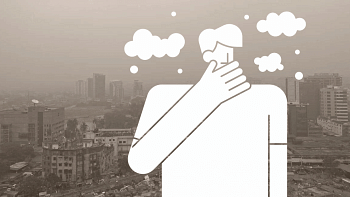
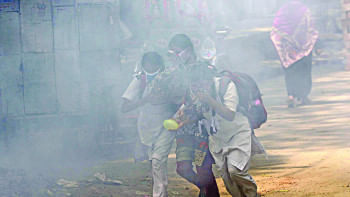



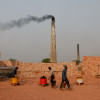
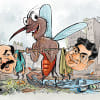
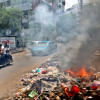




Comments